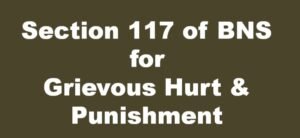Section 117 of BNS | Causing Grievous Hurt | 325 IPC (Old) | Bail Provision
Section 117 of BNS
The section 117 of BNS talks about voluntary causing grievous hurt and punishment thereof.
Under Indian Penal Code, 1860, Section 325 was the similar provision as Section 117 of BNS described.
Section 117 of the Bharatiya Nyaya Sanhita (BNS)
(1) Whoever voluntarily causes hurt, if the hurt which he intends to cause or knows himself to be likely to cause is grievous hurt, and if the hurt which he causes is grievous hurt, is said “voluntarily to cause grievous hurt”.
(2) Whoever, except in the case provided for by sub-section (2) of section 122, voluntarily causes grievous hurt, shall be punished with imprisonment of either description for a term which may extend to seven years, and shall also be liable to fine.
(3) Whoever commits an offence under sub-section (1) and in the course of such commission causes any hurt to a person which causes that person to be in permanent disability or in persistent vegetative state, shall be punished with rigorous imprisonment for a term which shall not be less than ten years but which may extend to imprisonment for life, which shall mean imprisonment for the remainder of that person’s natural life.
(4) When a group of five or more persons acting in concert, causes grievous hurt to a person on the ground of his race, caste or community, sex, place of birth, language, personal belief or any other similar ground, each member of such group shall be guilty of the offence of causing grievous hurt, and shall be punished with imprisonment of either description for a term which may extend to seven years, and shall also be liable to fine.
117(2) BNS Bailable or Not ?
Section 117(2) BNS is bailable offence under the Bhartiya Nayaya Sanhita, 2023 but other section 117(3) BNS and Section 117(4) BNS are non-bailable.
Punishment for Section 117 of BNS, 2023
The following are the punishment and bail provisions for Section 117 of Bharatiya Nyaya Sanhita (BNS) :-
Section 117(2) of BNS
(a) Voluntarily causing grievous Hurt
(b) Imprisonment of 7 years
(c) Bailable
Section 117 (3) of BNS
(a) If hurt to result in permanent disability or persistent vegetative state.
(b) Rigorous imprisonment for not less than 10 years but which may extend to imprisonment for life which shall mean the remainder of the person’s natural life.
(c) Non-Bailable
Section 117(4) of BNS
(a) Grievous hurt caused by a group of 5 or more persons.
(b) Imprisonment for 7 years and fine.
(c) Non-Bailable
Anticipatory Bail for Section 117 of BNS is maintainable or not ?
Accused can file applicable for Anticipatory Bail before High Court or Session Court.
The Section 482 of the Bharatiya Nagarik Suraksha Sanhita (BNSS), 2023 speaks about the provision of anticipatory bail.
Although both High Court and Session Court has concurrent jurisdiction over Anticipatory Bail, however, individual should first avail remedy with Session Court.
Nature of Injury and use of Weapon are Relevant Factor
Yes, the nature of injury and use of Weapon are relevant factor while bringing the case under section 117 of BNS.
The facts involved in a particular case, depending upon various factors like size, sharpness, would throw light on the question whether the weapon was a dangerous or deadly weapon or not.
That would determine whether in the case section 325 IPC or section 326 IPC would be applicable.
Considering the size of the used stone, Court did not accept that accused used a dangerous weapon.
Therefore, the conviction was altered to section 325 IPC,1860.
Case Reference: Mathai versus State of Kerala, AIR 205 SC 710
Absence of Intention to cause death may invoke 117 of BNS
Where a player in a friendly cricket match blew a stump against another player which hit his head and caused death.
The court held that, since the evidence did not proved the intention to cause death or the likelihood.
The Court held that the accused committed an offence under Section 325 by causing injury with a blunt weapon.
Case Reference: Sailesh vs State of Maharashtra, 1995 Cr LJ 914 (Bom)
Where medical evidence showed that attack on the forehead of the deceased was by a Lathi.
In absence of correlation between the internal injury and external injury caused by the accused.
The Supreme Court held that conviction of the accused under section 325 IPC, 1860 is proper and not under section 304, Part II, IPC, 1860.
Case Reference : Mohinder Singh, AIR 1986 SC 309
Injury under sudden provocation may invite conviction
In a fight between two groups, one person received one stick blow on the head and died a week after treatment and operation.
The accused did not have any knowledge that blow would cause death of that person.
Higher Court altered the conviction of the accused from section 304 Part II/34 to sections 325 and 34.
Case Reference : Halke v State of MP, AIR 1994 SC 951
Absence of Pre-Meditation of attack is not murder
In the incident of an altercation between father and the son.
The son gave a blow on the head of his father with a heavy stick and ran away.
The victim died after one week in the hospital. The offence fell under section 325 and not under section 302 because son did not attack with pre-meditated object.
Case Reference : Bellana Kannam Naidu v State of AP, 1994 Cr LJ 1146 (AP).

